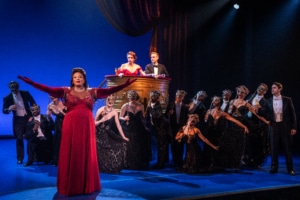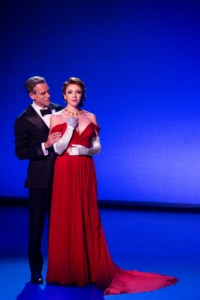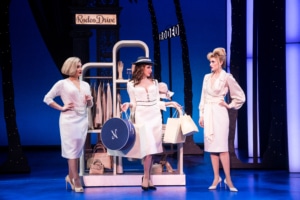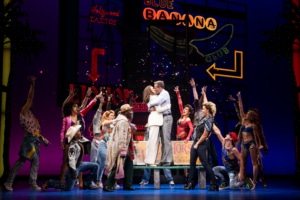DCPA NEWS CENTER
Enjoy the best stories and perspectives from the theatre world today.
Enjoy the best stories and perspectives from the theatre world today.
If you’re a movie fanatic, you’ve likely confessed to a friend that Pretty Woman is a “guilty pleasure.” But why be ashamed to admit it? The attitude in our society toward romantic comedies, a genre typically associated with women, implies they shouldn’t be taken seriously. The implication is that only superficial women would waste their time on such frivolity; smart, mature women watch documentaries and Tarantino films.

Adam Pascal and Olivia Valli. Credit: Matthew Murphy for MurphyMade
What you might not know is Pretty Woman helped pioneer a new era of film: the “romcom.” The genre was inspired by comedies from the 1930s and 40s where movie stars such as Katharine Hepburn and Joan Crawford shined as spunky, driven heroines. With a nod to its predecessors, Pretty Woman centered around a feisty female character, which showcased her wit and independence. The film established the “modern-day fairytale,” setting the foundation for decades of romcoms to come.
In 1990, Pretty Woman subverted all cultural norms by becoming the year’s second most popular movie (behind Ghost, another romantic film). It was highly unusual for female-centric movies to top the charts at the time. In fact, Pretty Woman is still one of the highest grossing romantic comedy films of all time. Even more unusual was that the film’s star, Julia Roberts, was not yet a household name – though her role in Pretty Woman earned her a Golden Globe and an Oscar nomination.

Amma Osei and The Company of Pretty Woman: The Musical. Credit: Matthew Murphy for MurphyMade
And to this day, Pretty Woman is an incredibly recognizable film. Think of Richard Gere closing the jewelry box on Julia Roberts’ fingers and her infectious laughter. Your mind can conjure the image immediately, whether you saw the movie ten years ago or last week. Pretty Woman is the sort of movie that feels ingrained in our DNA. It isn’t just a movie; it’s a cultural touchstone for the 80’s and 90’s, for cinema, and for an entire film genre.
As time has passed, critics have examined the film through a more modern lens, and that’s where Broadway stepped in. Pretty Woman: The Musical rose to the occasion and brought a fresh, “musicalized” version of this fairytale to the stage. Largely based on the film, the musical’s development was spearheaded by the film’s director, Garry Marshall. The creative team had the freedom to develop the story in a more contemporary light.

Adam Pascal and Olivia Valli. Credit: Matthew Murphy for MurphyMade
Paula Wagner, the musical’s lead producer, said one of the greatest developments was through music. “There is something very intimate about when you sing a song, and it stops time. It allows the characters to express themselves more deeply and communicate to an audience their inner lives.” The music in Pretty Woman: The Musical, written by Grammy® winner Bryan Adams and Jim Vallance, allows audiences to dig deeper into Vivian’s inner thoughts and wants. “She sings a song called ‘I Can’t Go Back,’ and there’s a line where she says, ‘it’s me who’s in control,’” explained Wagner. “Vivian knows who she is, what she deserves, and she won’t settle for less.”
The romantic plot remains traditional, but Vivian is no pushover. She is quick to speak up, she dictates how she wants to be treated, and she is openly defiant of social convention. Vivian offers audiences a glimpse into personal and romantic fulfillment, which she achieves through her own ambition. “She embodies the strength that we all love to see in a woman,” said Wagner.
While it’s easy to watch the production and be captivated by Vivian, it’s important to recognize the changes audiences can also see in Edward, her love interest. Edward changes Vivian’s situation, but it’s Vivian’s spark that drew him to her in the first place and changes him for the better.

(L to R) Kelsee Sweigard, Olivia Valli, and Becca Suskauer. Credit: Matthew Murphy for MurphyMade
Edward has money, success, and confidence, but he’s trapped in a prison of his own making. “He is not in control of his life; he is a puppet controlled by his money and greed,” said Wagner. The transactional “romance” between himself and Vivian suits him fine. It isn’t until Vivian’s charm breaks down his walls that they learn and grow together. “Both of these people take a journey in which they find their own authentic selves,” explained Wagner. “And in finding their own authenticity, they find each other. They find true love.”
Although there have been some changes and developments to the production, audiences will still see the iconic movie moments. “You walk a fine line, bringing such a famous film to the stage,” said Wagner. “All of the things that the audience wants and expects are there, but we needed to go further, to deepen and broaden it. If you love the film, you’ll love the musical.” Theatregoers will be thrilled to hear the famous one-liners, to see the memorable costumes, and be swept up in the romantic scenes.

The Company of Pretty Woman: The Musical. Credit: Matthew Murphy for MurphyMade
From its romcom roots through its contemporary development, there is no question that this production deserves to be taken seriously. “This story has a depth to it, even though it’s a story meant to bring people joy,” expressed Wagner. “We all want to sit and watch a show that will make us happy. We all want to ride off into the sunset.”
Pretty Woman: The Musical is a powerhouse, female-centric production; a tale of redemption, hope, and aspiration. “We need women’s voices. They are strong, they are reflective of our culture, and they should be heard,” said Wagner. “I like the idea that we can make them heard through beautiful, uplifting fairytales like Pretty Woman: The Musical.”
DETAILS
Pretty Woman: The Musical
Aug 2 – 14 • Buell Theatre
ASL Interpreted, Audio Described and Open Captioned performance: Aug 14 at 2pm
Tickets
